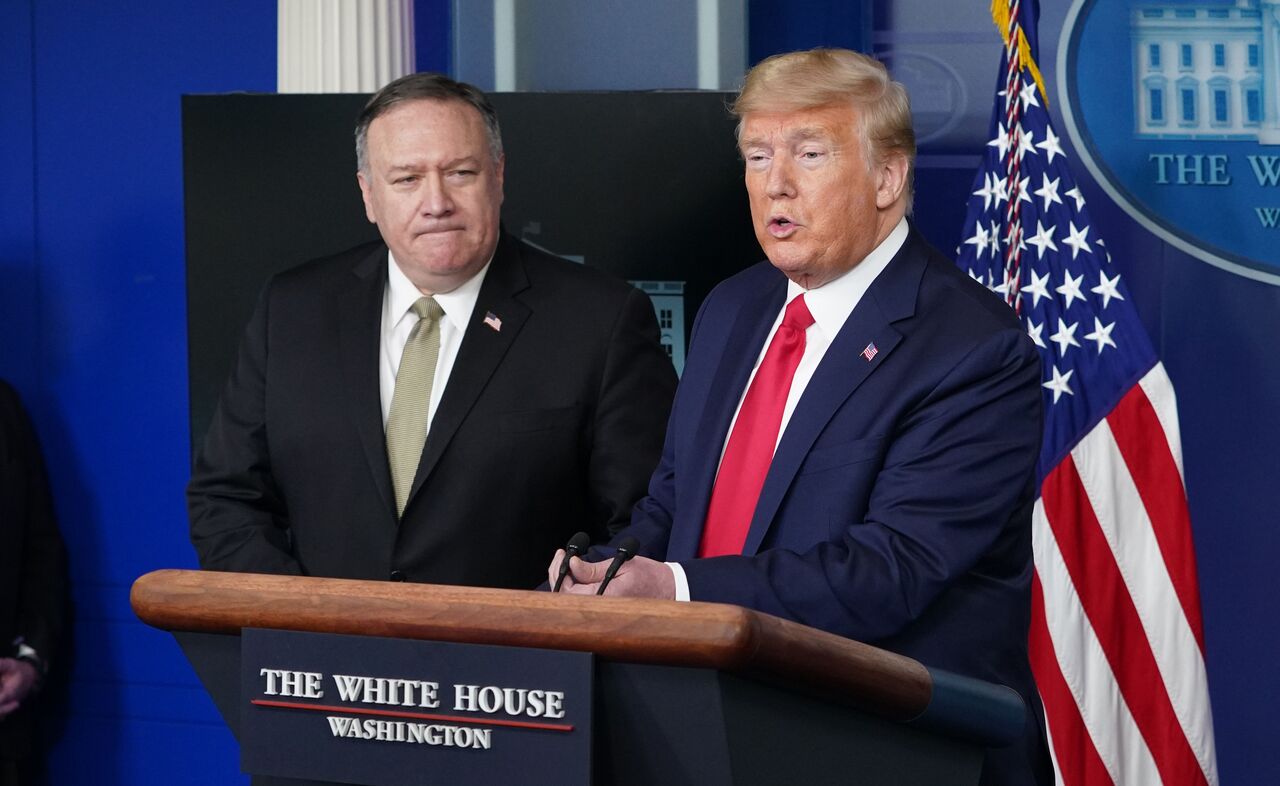Trump says US investigating whether coronavirus came from Wuhan lab
Sign up now: Get ST's newsletters delivered to your inbox

Secretary of State Mike Pompeo (left) said Beijing needs to come clean on what it knows.
PHOTO: AFP
WASHINGTON - US President Donald Trump said on Wednesday his government is investigating the source of the Covid-19 epidemic, declining to rule out the theory that the coronavirus originated from a laboratory in China despite the lack of evidence.
There is no proof the virus was created, though previous US diplomatic cables warning of earlier safety issues in a Wuhan research facility studying bat viruses have fuelled speculation that Covid-19 could have come from there.
Chinese foreign ministry spokesman Zhao Lijian said on Thursday: "I want to remind you that the head of the World Health Organisation has stated many times that there is no evidence that the new coronavirus was produced in the laboratory. Many well-known experts in the world also believe that there is no scientific basis for such claims as laboratory leaks."
He was responding to a Fox News report that sources in the US government had "increasing confidence" Covid-19 was a bat-to-human virus which came from a Wuhan laboratory, although it added that the evidence was "not definitive and should not be characterised as such".
Asked to confirm the same report, Mr Trump said on Wednesday at his daily briefing: "I will tell you, more and more, we're hearing the story. And we'll see… We are doing a very thorough examination of this horrible situation that happened."
A day earlier, top US general Mark Milley cast the same doubt, saying American intelligence suggested the coronavirus was likely to have occurred naturally instead of being made in a laboratory, but that there was no certainty either way.
Scientists have slammed claims that it was made in a lab.
"We stand together to strongly condemn conspiracy theories suggesting that Covid-19 does not have a natural origin," a team of 27 scientists from outside China said in a statement in the Lancet medical journal in February.
"Conspiracy theories do nothing but create fear, rumours, and prejudice that jeopardise our global collaboration in the fight against this virus," they said, adding that scientists from around the world overwhelmingly conclude that the coronavirus originated in wildlife.
Despite the scientific evidence to the contrary, nearly 30 per cent of Americans believe the coronavirus could have been made in a lab, a Pew Research Centre survey last week found.
A Washington Post column on Tuesday said that although the virus was natural, this was not the same as ruling out the possibility that it was leaked from a Wuhan laboratory.
It cited official cables from American diplomats who visited the Wuhan Institute of Virology in 2018, that warned of inadequate safety and management issues at the research facility and called its work on bat coronaviruses risky.
The institute has dismissed claims the virus was synthesised at one of its laboratories or leaked from its facilities.
Top officials in the Trump administration and Republican China hawks continue to publicly discuss the theories, although Mr Trump declined at Wednesday's briefing to say what he discussed with Chinese president Xi Jinping regarding the Wuhan laboratory.
Secretary of State Mike Pompeo said in a Fox News television interview that the US government knew the virus originated in Wuhan, and that the Institute of Virology was only a handful of miles away from the wet market linked to the initial virus outbreak.
"We really need the Chinese government to open up," said Mr Pompeo as he called on Beijing to let the world's scientists know exactly how the virus began to spread.
Some experts are wary that conspiracy theory discussions are part of a broad strategy by the Trump administration to deflect attention to China and external parties such as the WHO, amid a rising case count and death toll in the US.
There were 645,000 confirmed cases and more than 28,000 deaths as of Thursday reported in the US, more than in any other country.
"Are the new leaks regarding the Wuhan lab accident hypothesis because there is something new, or are they part of the broader "blame China" Trump reelection strategy that is rolling out? The stakes could not be higher, so the bar for evidence has to be very high. No media reporting so far has been convincing," said China watcher Bill Bishop, who writes the Sinocism newsletter.


